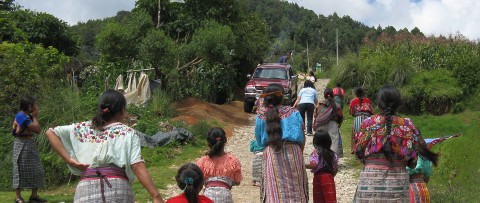- Team Impact
- Dominican Republic
Empowering young leaders.
Transforming futures.
Transforming futures.

In Mexico, she and her toddlers were captured and held for six days. Along with other families, they were served the same unrecognizable food three times a day.
“One day, they came to fumigate, even though kids were there. They didn’t care. I thank God that my children never got sick there, but I did see some sick children who had diarrhea and vomiting.”
Imagine being so afraid for your life and your children’s lives that you’re willing to do something you know is dangerous, illegal and — likely — unsuccessful.
Most people’s primary goal is very basic: to help their families.
That’s the risk many people face when they choose to leave their homes in search of a better life in another country. For many, the threat of gang violence and being forced into crime is enough to steer them toward this journey. For others, it’s a lack of daily necessities and education for their children. The reasons are many and varied as to why people choose to leave loved ones, take out unaffordable loans and make the most dangerous journey of their lives.
What’s most troubling is that many of those who attempt to cross the border are children. The majority come from Latin America. According to the Migration Policy Institute (MPI), “From the start of fiscal year 2014 through July 31, 2015, 74 percent (72,968) of the unaccompanied minors apprehended by U.S. Customs and Border Protection at the U.S.-Mexico border were from El Salvador, Guatemala and Honduras.”
Illegal immigration is a hot political topic in the United States. But it’s more than just talking heads. On the other side of the debate are real people in need — people so desperate, in fact, they are willing to take out a loan they might never be able to repay, put their life into someone else’s hands and make a grueling trip with no guarantee of success.

.
Despite the risks, some families are desperate to escape gang violence and criminal activity in hopes of a better life in the U.S.
.
Staff at Children International, a humanitarian organization working to end global poverty by focusing on kids, spoke with the mothers of several sponsored children to learn why they or their kids were willing to take these risks. (We've changed the mothers' names to protect their anonymity.)
Martina’s 17-year-old son left Guatemala to look for work in the U.S. You might call him one of the lucky ones, because he made it safely from Mexico into the U.S. and landed a job. It cost his family almost 80 times what his father makes in one month to pay for the journey, but Martina says her son is already sending money back home to pay for the loan.
.
María’s son (17) also left Guatemala to look for work. The teen had become the main wage earner after his father left the family several years ago. So, although Carlos had a job, the pay wasn’t enough to support the family of six. He wanted his younger siblings to be able to continue their studies, which required them to have uniforms and school supplies — unaffordable luxuries for a family barely getting by. Thus, the young man decided to look for work in the U.S. to pay for these necessities.
.
Alma was lured to the U.S. from Honduras with rumors of amnesty and hopes of escaping extortion threats. Because Alma has family in the U.S., she was optimistic she and her 3- and 1-year-old sons could gain asylum. However, the family couldn’t make it beyond Mexico. They now live in Guatemala and are in debt due to the $7,000 loan she paid the “coyote” to enter the U.S.
.
CI field staff try to discourage families from efforts to enter the U.S. illegally. They work to educate families about the risks of illegal border crossings. Unfortunately, many staff members don’t learn of families’ decisions until after the fact, when a sponsored child hasn’t been accounted for.
While the services CI provides are of great benefit in alleviating sponsored families’ situations and are critical to preparing children for futures beyond poverty, some families believe they can’t wait for that future. They feel they have no choice but to leave their situations and look for work in the U.S. Still, CI is making in-roads in convincing families of the dangers.

CI programs, like Sports for Development in Guatemala, support kids’ health, education, empowerment and employability.
CI knows that the challenges for these families are enormous, so its programs focus on supporting kids’ health, education, empowerment and employment. Our Guatemalan and Honduran agencies address families’ biggest concerns, like malnutrition, school and job training. And our community centers give kids safe spaces to receive tutoring, learn new skills and just be kids. We know that giving these kids a solid foundation today will help them break the cycle of poverty they feel is inevitable.
Comments
You must be logged in to comment. If you have an account, click here to log in.